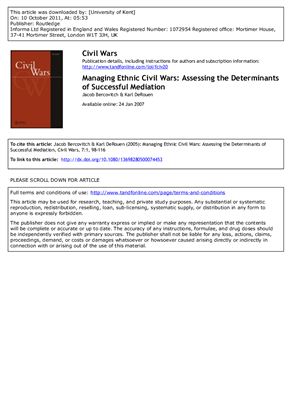This paper looks at how violent ethnic conflicts are managed. The
paper
separates ethnic civil wars from the more general class of ethnic
conflicts. More specifically, we examine these conflicts, and seek to
understand the extent to which mediation can play an effective role in
managing such conflicts, and which factors have the most impact on its
performance and effectiveness. We set up a theoretical framework from
which we derive several propositions on mediation effectiveness. These
are analyzed using an original data set of over 900 mediation cases in
ethnic civil wars. The analysis suggests that the use of a neutral
mediation site and initiation by both parties in the war each enhance the
likelihood of mediation success. Conflict intensity, third-party initiation
and superpower mediation all decrease the likelihood of success. Ethnic
civil wars over issues of secessionism and autonomy are also found to be
more difficult to mediate than ethnic civil wars over issues of religion
separates ethnic civil wars from the more general class of ethnic
conflicts. More specifically, we examine these conflicts, and seek to
understand the extent to which mediation can play an effective role in
managing such conflicts, and which factors have the most impact on its
performance and effectiveness. We set up a theoretical framework from
which we derive several propositions on mediation effectiveness. These
are analyzed using an original data set of over 900 mediation cases in
ethnic civil wars. The analysis suggests that the use of a neutral
mediation site and initiation by both parties in the war each enhance the
likelihood of mediation success. Conflict intensity, third-party initiation
and superpower mediation all decrease the likelihood of success. Ethnic
civil wars over issues of secessionism and autonomy are also found to be
more difficult to mediate than ethnic civil wars over issues of religion

